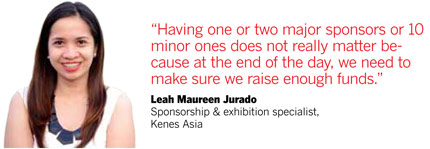
Securing event sponsorship is becoming increasingly tough for event organisers, but industry players say maintaining a strong content and offering customised sponsorship deals can ease the process. By Karen Yue
Time may have placed several years between the global financial crisis of 2008 and today, but the impact of the world’s worst economic downturn since the Great Depression of the 1930s has changed the way companies conduct their business and regard expenditure.
For business event organisers, securing sponsorship has become a challenge as major companies are more selective about what they want – and can afford – to support. And when they do fork out sponsorship dollars, they demand clear reports on their investment.
Nancy Tan, managing director of Ace:Daytons Direct (International), a Singapore-based conference, exhibition and events organiser which has major congresses such as the 7th World Congress of Endoscopic Surgery and the 21st Congress of the Asia-Pacific Academy of Ophthalmology under its belt, told TTGmice: “It has been increasingly tough to secure sponsorships for trade and association events, as money is hard to come by due to the economic climate. Moreover, companies are paying even greater attention to returns on their investments.”
Shirlena Soh, director of operations with the Human Genome Organisation International, recalled how her convention in Geneva this year had a “difficult sponsorship situation” because “companies were cutting back on their expenditure”.
The challenge of securing event sponsorship is exacerbated by the presence of companies that do not quite understand how such marketing investments work.
Tan said: “There are companies that expect immediate ROI, in the form of sales returns, from a sponsorship investment, and that may not be possible at times. Unfortunately, not all companies understand the true value of sponsorship.
“Naturally, we find that multinational companies tend to be more aware of what event sponsorship can deliver, as they have experience in such activities and have the money for it. That said, more small, local firms are starting to appreciate what event sponsorship can do for them and some have ventured into sponsoring something at trade and association events.”
Although Oakwood Worldwide is no stranger to event sponsorship, having participated in over 55 global events in 2013 alone, its Asia Pacific managing director, Craig Ryan, admitted that returns on event sponsorship investment can be tricky to determine. “There are, however, a variety of factors we look at to determine the benefit from a sponsor’s point of view. Leads generated, amount of traffic flow, brand impressions of our logo and the amount of media exposure generated are examples of some of the metrics we evaluate to measure ROI from an event,” said Ryan.
Medical considerations
For medical and pharmaceutical associations, stricter laws regarding international healthcare meetings and education seminars add further hurdles to their quest for event sponsorship. These regulations include prohibition on the use of luxury hotels during such gatherings, a cap on the value of hosted delegate meals and limitations on event sponsorship by healthcare firms.
Roger Lijnen, executive director of the International Society for Fibrinolysis and Proteolysis, lamented: “In the past, we could go to big pharmaceutical companies and tell them that we are hosting an opening dinner for our congress, for instance, and they would say, ‘do it and just send us the bill’. Now, not anymore.”
Richard Holmes, international director of meetings with the International League against Epilepsy, has also faced difficulties. “In the field of epilepsy, many drugs have come off patent, resulting in more generics being made available. Hence, main companies are less keen on sponsoring meetings,” said Holmes, who added that companies are sponsoring fewer delegates to attend congresses, cutting back on hosting social events, and withdrawing from sponsoring congress bags or lunches.
Big sponsors – a thing of the past?
Lijnen and Tan believe that gone are the days when a single major sponsor would come in and pay for multiple aspects of an event. Tan said: “With corporate expenditure being watched so closely, organisers today will find it easier to convince a company to sponsor one relevant item, such as a lunch symposium or a particular education session. It is common now for events to have the support of several small – but still very important – sponsors.”
While the International Feng Shui Association – Australia Chapter has no “shortage” of event sponsors, president Janene Laird said: “We’ve found that rather than rely on a few big sponsors, we get better results from asking for modest amounts from several smaller ones.”

However, Leah Maureen Jurado, sponsorship & exhibition specialist with Kenes Asia, thinks that events today still stand a chance at scoring one or two major sponsors. “It all depends on the event. Some therapeutic areas in the medical field would have new trials and research, which translate to companies having new drugs in the pipeline and would therefore require a huge presence at medical conferences,” she explained.
Impact on events
Lijnen finds that social events during congresses are most affected by the decline in event sponsorship. He said: “We have cut down on the scale and lavishness of social functions over the last two years.”
The society has also raised congress registration fees to cope with the “new reality”.
Although fewer five-star hotels are used now, Lijnen said the move is in reaction to stricter laws on healthcare events.
“We do not avoid pricey destinations. What we do is to focus on local associations that are very committed to bringing the congress to their country. Because they are hungry for this hosting right, they would do their utmost to attract local attendees and that means more income for the society,” he added.
While Soh noted that the cost of speakers, venue hire and F&B catering make up the bulk of an event’s expenditure, she said these were components the association would never cut back on.
“Other things like gift production and programme print-outs are items that we will look into when restructuring our costs,” she said, adding that her society has always taken a prudent approach to event budgeting which allows conferences to still be held even when sponsorship dollars are down.

For Holmes, the reduction in delegate sponsorship “means that those who come to the congress at their own expense (are serious about it) and will attend sessions”. He added: “It is now easier to predict the size of session rooms needed.”
Should event sponsorship continue to dwindle, Holmes thinks that medical associations may have to eventually “hold smaller meetings on a regional basis”.
Keep the money coming
Association executives and conference organisers agree that event content is key to attracting sponsors. Events with strong content will naturally draw quality attendees – the very people sponsors love.
And in an environment where sponsorship is hard to come by, organisers must never compromise the quality of the programme to suit a key sponsor, warned Tan. “For example, skewing the programme towards the messages of the key sponsor is a no-no. That is not fair to attendees and other sponsors,” she said.
When asked for qualities an event must possess in order to qualify for Oakwood Worldwide’s sponsorship dollars, Ryan said the event must offer an educational aspect, be held in a good location so as to enable the company to reach clients in the area and build new relationships in the market, have a good reputation and strong attendance, offer reach to an audience of decision-makers, and be led by a proactive partner who keeps sponsors regularly updated and ensures sponsor benefits are fulfilled.
Citing an example of a successful sponsorship exercise, Ryan said: “The Worldwide ERC Global Mobility Summit in Shanghai this March allowed us to promote the Oakwood Worldwide brand and solutions to mobility professionals. The event enhanced our competitive position as a serviced accommodation provider. Most importantly, it allowed us to connect with potential clients and existing partners, and expand our market share. We achieved good qualified leads from the event.”
Deals that are customised to the needs of individual sponsors help too, and more are demanding such tailored packages.

Ryan said: “In view of leaner budgets and greater emphasis on event ROIs, organisers need to be more flexible in terms of offering sponsorship packages. Not every standard package caters to every potential sponsor. We look for (partners) that are able to offer flexibility, opportunities for customisation and delivers forward-thinking, innovative ways for us to participate in events.”





















